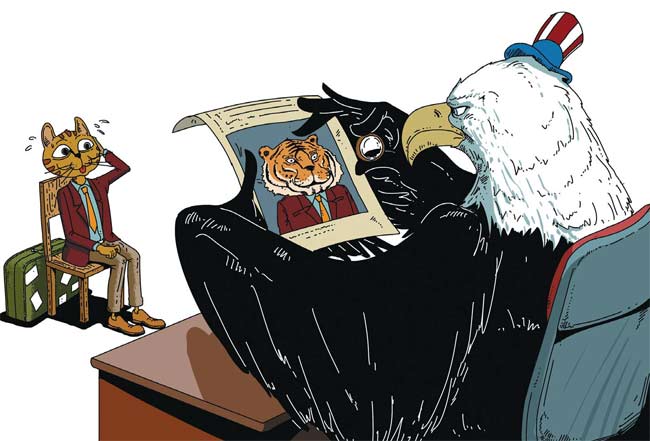 |
|
LI FENG / CHINA DAILY |
Many Chinese students are fueling an industry of fraudulent US university applications, reports He Na in Beijing.
On the day that Li Chang, 19, received admission offers from seven well-known US universities in late June, his father Li Wanjin had the most satisfying sleep in a year.
The relieved father called many friends the next morning to share the news.
|
Wang Huiyao is the director of the non-profit think tank Center for China and Globalization First person | Wang Huiyao Faking college application materials is a serious problem as it is related to fairness in education and meritocracy. I think the fundamental reason behind the problem is the lack of complete meritocracy in China. Inadequate punitive measures, a tolerance for counterfeiting and the recruitment agencies need to be blamed for the rise in fraudulent applications. Figures from the Ministry of Education show that by the end of 2013, more than 3 million Chinese had studied overseas since 1978. In 2013, 413,900 Chinese students were overseas, an increase of 3.58 percent from the year before. Recruitment agencies are developing fast on the back of Chinese parents’ rising demand to send their children for overseas study, but the market is in disarray because of a lack of management and supervision. The counterfeiting is part of a larger problem. More Chinese students who studied overseas are returning after graduation. In 2013, 353,500 people went back to work in China aft er graduating from overseas universities, an year-on-year increase of 29.35 percent, according to the Education Ministry. The Chinese government has welcomed these overseas returnees by offering various kinds of awards and preferential policies. But students with fake application materials make it difficult to tell whether the money spent on recruiting them is worth it. Often, we spend a lot of money and have high expectations of overseas returnees but fi nd out later that they are not up to the mark. Wang Huiyao was speaking to He Na. |
He also called the recruitment agency he used to help his son's university applications - and promised to pay it the rest of the 50,000 yuan ($8,060) fee on time.
Except for the Test of English as a Foreign Language and remote video interviews that his son had to do in person, the rest of the preparations and work for the applications was done by friends and the agency.
The agency handled and "improved" the application materials including the student's resume, recommendation letters, intern experience and high-school transcripts.
Friends who are English-language specialists or foreigners were also mobilized to help prepare 10 self-recommendation letters written to read like those that came from the hand of a high-school student.
"These letters were really good. Even if I were the admission officers, I would like the boy whom these letters described," Li Chang joked.
Many have noticed the problem associated with such applications.
On July 1, cable TV channel CNN reported admission officers saying that as many as one in 10 applications to US colleges by Chinese students may include fraudulent materials like fake essays and high-school transcripts.
The report also blamed recruitment agencies. The Ministry of Education has certified nearly 500 recruitment agencies, but thousands more are said to operate outside official scrutiny.
All of this is occurring as the number of Chinese applicants rises and US colleges admit more of them. Almost one in four foreign students on US campuses is Chinese and most pay full tuition.
Figures from the Institute of International Education, an independent, non-profit education group, show that the number of Chinese students in the US reached 235,597 in the 2012-13 academic year, increasing 21.4 percent from the year before.
Tip of the iceberg
Harry Lee, CEO of Amber Education Group, said the problem may be much worse.
"The US has long been a hot destination for Chinese who want to study overseas. But Chinese applicants are often unfamiliar with the admission procedures for US colleges, so about 90 percent of students will seek recruiting agencies as representatives," Lee said.
"In Hong Kong, recruiting agencies charge only about 6,000 yuan for a student, but in the mainland, the price generally stays at 20,000 to 30,000 yuan and doubles if applying to the top 50 US colleges," he said.
"I often hear Hong Kong students from US schools complain that some mainland students in their classes are actually below the average level. Some cannot even catch up with the classes. They fail tests and cannot graduate as scheduled."
Xiong Bingqi, deputy director of the 21st Century Education Research Institute, said the problem is a serious one.
"In 2012, 299 Chinese students in New Zealand were found with counterfeit application materials. They received deportation orders from the New Zealand government and were banned from entering the country for five years," he said.
Using fake application materials is also morally wrong. It leaves an indelible stain on the perpetrator, brings shame on all Chinese students and makes it more difficult for others who are applying to the schools, Xiong said.
|
|
|
|
|
|
|
|
